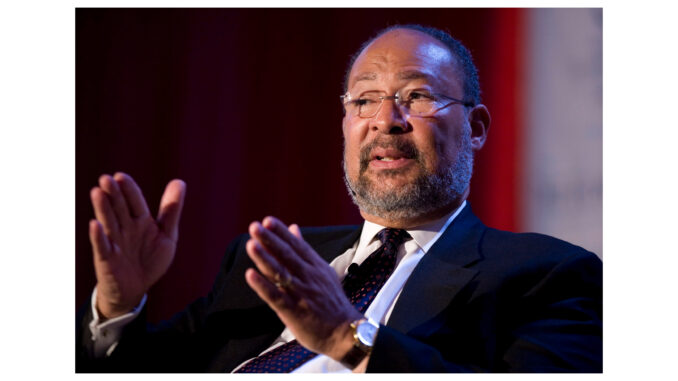
NEW YORK — Richard Parsons, one of corporate America’s most prominent black executives who held top posts at Time Warner and Citigroup has died. He was 76.
Parsons, who died at his Manhattan home, was diagnosed with multiple myeloma in 2015 and cited “unanticipated complications” from the disease.
The financial services company Lazard, where Parsons was a longtime board member, confirmed his death.
Parsons’ friend Ronald Lauder told The New York Times that the cause of death was cancer.
Parsons stepped down Dec. 3 from the boards of Lazard and Lauder’s company, Estée Lauder, citing health reasons.
“Dick was an American original, a colossus bestriding the worlds of business, media, culture, philanthropy, and beyond,” Ronald Lauder said in a statement on behalf of the Lauder family.
David Zaslav, the CEO of Time Warner successor Warner Bros. Discovery, hailed Parsons as a “great mentor and friend” and a “tough and brilliant negotiator, always looking to create something where both sides win.”
“All who got a chance to work with him and know him saw that unusual combination of great leadership with integrity and kindness,” Zaslav said, calling him “one of the great problem solvers this industry has ever seen.”
Parsons, a Brooklyn native who started college at 16, built a track record of steering big companies through tough times.
He returned Citigroup to profitability after turmoil from the global financial crisis and helped restore Time Warner after its much-maligned acquisition by internet provider America Online.
“Dick’s storied career embodied the finest traditions of American business leadership,” Lazard said in a statement. The company, where Parsons was a board member from 2012 until this month, praised his “unmistakable intelligence and his irresistible warmth.”
“Dick was more than an iconic leader in Lazard’s history — he was a testament to how wisdom, warmth, and unwavering judgment could shape not just companies, but people’s lives,” the company said. “His legacy lives on in the countless leaders he counseled, the institutions he renewed, and the doors he opened for others.”
Parsons was known as a skilled negotiator, a diplomat and a crisis manager.
Although he was with Time Warner through its difficulties with AOL, he earned respect for the company and rebuilt its relations with Wall Street. He streamlined Time Warner’s structure, pared debt and sold Warner Music Group and a book publishing division.
Parsons joined Time Warner as president in 1995 after serving as chairman and chief executive of Dime Bancorp Inc.
In 2001, after AOL used its fortunes as the leading provider of Internet access in the U.S. to buy Time Warner for $106 billion in stock, Parsons became co-chief operating officer with AOL executive Robert Pittman. In that role, he was in charge of the company’s content businesses, including movie studios and recorded music.
He became CEO in 2002 with the retirement of Gerald Levin, one of the key architects of that merger. Parsons was named Time Warner chairman the following year, replacing AOL founder Steve Case.
Parsons stepped down as CEO in 2007 and as chairman in 2008. A year later, AOL split from Time Warner and began trading as a separate company, following years of struggles to reinvent itself as a business focused on advertising and content.
A board member of Citigroup and its predecessor, Citibank, since 1996, Parsons was named chairman in 2009 at a time of turmoil for the financial institution. Citigroup had suffered five straight quarters of losses and received $45 billion in government aid.
Citigroup returned to profit under Parsons, starting in 2010, and would not have a quarterly loss again until the fourth quarter of 2017. Parsons retired from that job in 2012.
“Dick Parsons was a brilliant and transformational leader and a giant of the media industry who led with integrity and never shied away from a challenge,” NBA Commissioner Adam Silver said.
Parsons, a Republican, previously worked as a lawyer for Nelson Rockefeller, a former Republican governor of New York, and in Gerald Ford’s White House. Those early stints gave him grounding in politics and negotiations.
Parsons, whose love of jazz led to co-owning a Harlem jazz club, also served as Chairman of the Apollo Theater and the Jazz Foundation of America. And he held positions on the boards of the Smithsonian National Museum of African American History and Culture, the American Museum of Natural History and the Museum of Modern Art in New York City.
Parsons played basketball at the University of Hawaii at Manoa and received his law degree from Albany Law School in 1971.

